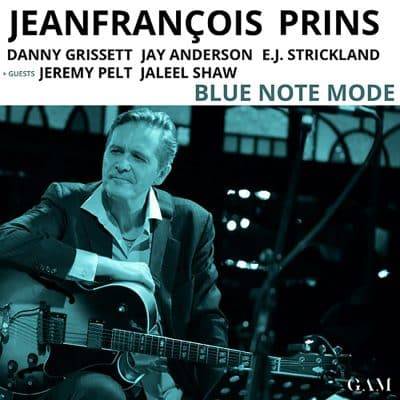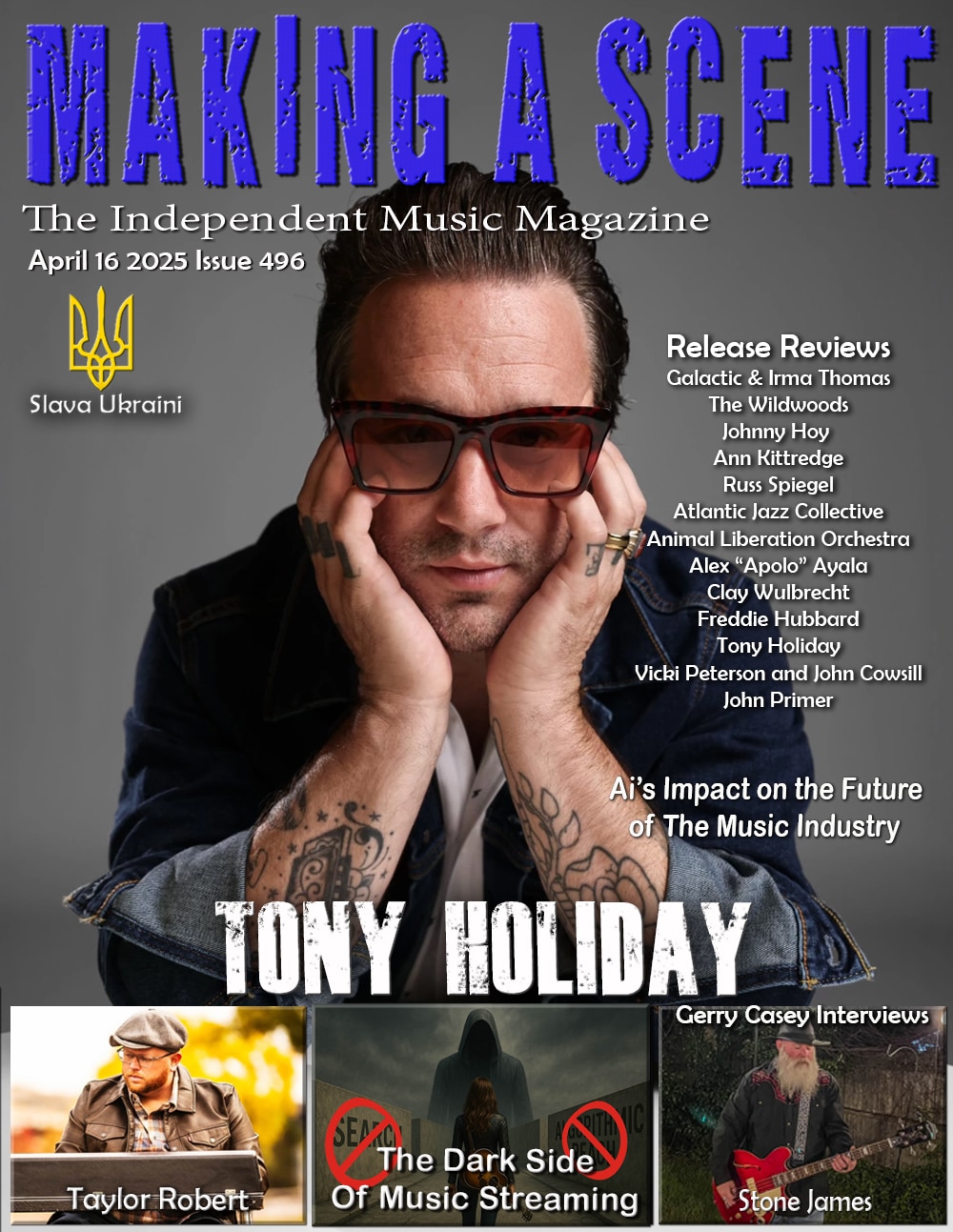JeanFrancois Prins Blue Note Mode
 JeanFrancois Prins
JeanFrancois Prins
Blue Note Mode
GAM
As the title and blues hued album cover suggest, Blue Note Mode is an ode to the classic material of the Blue Note label, led by the Belgian- born guitarist JeanFrancois Prins, with a star-studded quartet/quintet/sextet through a dozen compositions over a generous 79 minutes. For added authenticity the group convened at the jazz shrine, Rudy Van Gelder Studio in Englewood Cliffs, NJ. Contributors are pianist Danny Grissett, bassist Jay Anderson, and drummer EJ Strickland who comprise the core quartet with trumpeter Jeremy Pelt aboard for four tracks and altoist Jaleel Shaw for three. The two appear on only one track together, Prins’ original “Move or Be Moved.” The leader penned three other originals that he mixes in with classic tunes from jazz giants Julian Priester, Wayne Shorter, Wynton Marsalis, Clifford Bown, and Thelonious Monk. There’s also a standard and careful listening will reveal quotes from other mostly Blue Note artists such as Grant Green, Lou Donaldson, Horace Silver, Ornette Coleman, and other jazz legends in some of the material.
The opener is Prins’ title track, that evokes such soul-jazz artists as Green, Donaldson, and Lee Morgan. One sequence has a funky element that evokes Eddie Harris’ “Cold Duck Time.’ Pelt, as is wont, blasts a series of high-pitched notes, drops in a quote from “Shortnin’ Bread” and struts confidently through his solo. Prins stays to the blues side of Grant Green’s influential guitar stylings, with Strickland getting a say that culminates in a fiery exchange between Prins and Pelt. The core quartet with lush tones from Prins and Anderson over Grisset’s sympatico comping render an elegant jazz waltz in Kirk Nurock’s “I’m Movin’ On,” before drummer Strickland moves from brushes to sticks, in turn ratcheting up the tempo and inspiring animated turns from the pianist and guitarist, yet the abrupt ending is startling, causing one to think there’s a power outage or equipment failure with the player. Calm resumes with Prins’ original “Prayer for Peace” as strains of Jim Hall, Bill Evans, and Charlie Haden by the respective players of those same instruments. We can’t help but think of Horace Silver’s “Prayer for Peace,” Ornette’s “Lonely Woman” or even McCoy Tyner’s “Search for Peace” as the quartet delivers this gorgeous, comfy warm blanket of sound. Prins and Grissett and even Anderson play deliberately, letting single notes just linger, suspended in the ether.
The rollicking “H and C’s Dance” by Belgian composer and pianist Michael Herr returns Pelt to the bandstand with well-constructed solo which Prins at first tamps down before lighting his own fire, swinging blissfully. Each soloist takes a remarkably different path, with Grissett leaning a bit toward heightened pensive while Anderson opts for a more flamboyant stance. Priester’s “Blue Sea” introduces Shaw’s alto. The saxophonist, heard most recently on albums from Nate Smith & Kinfolk and Dave Holland’s New Quartet, plays a fierce, spiraling approach, inspiring the guitarist to muddy up his deeply seeded blues. Prins maintains the blues vibe in his own “Ornette- Lee” named for the two influential altoists – Ornette Coleman and Lee Konitz, the latter of whom Prins played with for fifteen years in New York and three of the saxophonist’s albums, including 1996’s Live, recorded in France. (thanks to Bill Milkowski’s liners for these historical references). The guitarist and pianist blaze through this one over a robust walking bass line, igniting an exchange on the eights with Strickland for the explosive climax.
The requisite ballad follows in a delicate, light jazz waltz interpretation of Wayne Shorter’s “Diana” from his 1974 Native Dancer, a collaboration with Milton Nascimento. Prins delivers the warm melody while Shaw enters in a lower register before launching a stirring solo, triggering fervent turns from Grissett and another from Prins. Interestingly, there is no trumpet on Marsalis’ “J Mood” with the quartet hunkering down once again into indigo territory, pensive by turn. Pelt does reappear for an inventive samba take on Clifford Brown’s bebop classic “Daahoud.” Naturally, Pelt is flying with flurries of notes spraying from his horn, reflected in kind by Prins nimble rapid runs, all delivered over teeming Latin rhythms.
Album highlight, Monk’s “’Round Midnight” gets an especially creative arrangement from Prins, a requisite of sorts for one of most covered tunes in the jazz canon. Prins states the familiar melody cleanly and gracefully in the first section to Grissett’s thoughtful comping. Drummer Strickland kicks the quartet into the equally well-known swing section where Prins unleashes some sparks. Anderson plucks with authority, with Prins and Grissett once again essaying the moody theme, closing with the Latin inspired cadenza from Dizzy Gillespie. In typical yin and yang fashion, tempo, and intensity color Prins’ “Move or Be Moved,” the only full sextet one in the set. This hard bop burner has each soloist charging through in locomotive fashion, including a masterful workout on the kit from Strickland. Yet, the album’s biggest surprise comes with the closing romantic standard, Burton Lane/Alan Jay Lerner’s “Too Late Now,” dating to the 1951 movie Royal Wedding, as Prins sings in a Chet Baker-like style.
Prins shows no rust after a thirty-year hiatus (1994’s All Around Town), honoring the past tradition of great Belgian guitarists, and demonstrating his well-honed jazz vocabulary, flanked by these elite players. Blue Note Mode is a superb nod to tradition, with the resplendent sheen of the brand new.
- Jim Hynes
Buy Us a Cup of Coffee!
Join the movement in supporting Making a Scene, the premier independent resource for both emerging musicians and the dedicated fans who champion them.
We showcase this vibrant community that celebrates the raw talent and creative spirit driving the music industry forward. From insightful articles and in-depth interviews to exclusive content and insider tips, Making a Scene empowers artists to thrive and fans to discover their next favorite sound.
Together, let’s amplify the voices of independent musicians and forge unforgettable connections through the power of music
Make a one-time donation
Make a monthly donation
Make a yearly donation
Buy us a cup of Coffee!
Or enter a custom amount
Your contribution is appreciated.
Your contribution is appreciated.
Your contribution is appreciated.
DonateDonate monthlyDonate yearlyYou can donate directly through Paypal!
Subscribe to Our Newsletter
Discover more from Making A Scene!
Subscribe to get the latest posts sent to your email.















































